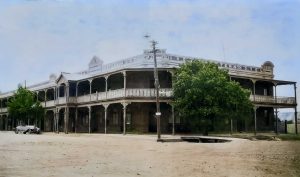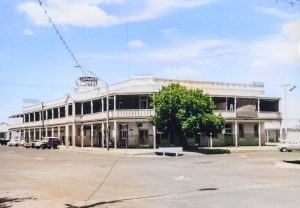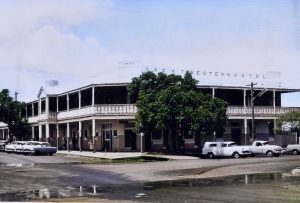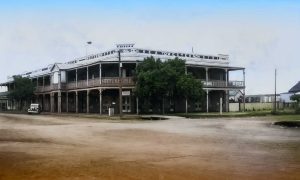The owner and first licensee was Pierce Goold. He must have liked the name ‘Great Western’ as he had also given it to his ‘Emporium’ on the opposite corner.
Originally occupying only the corner block, the Great Western was extended eastward in 1903 above Padula’s terrace of shops. Accommodation was increased by 14 rooms and the dining room doubled in size. The balcony also lengthened, becoming what is said to be the longest balcony in the southern hemisphere.
The balcony became a feature of the town. Dinner parties, meetings and political rallies were held there. On evenings when the Town Band played in the street, an audience would gather on the balcony. When it rained and the ‘Linsley Street River’ ran a banker with water up over the deep gutters, people sheltered on and under the balcony to watch the children race their improvised butter-box boats in the rushing stream of water. A crowd stood there to get a good view of the first electric power poles being erected in Cobar. It was not only a place to stroll or to relax in the evening, races of 100 yards were run on the balcony and small boys learned to ride their bicycles along it. A long history was hammered into those wooden boards by all those passing feet.
Of all the licensees of Cobar hotels and of the Great Western, Alicia Smiles was one of the most popular, running the boarding side as well as the pub. Many of the residents were young men working in the mines, some of them far from home and missing their families. In some ways, Mrs Smiles stood in as a mum. One of her boarders was a young man called Walter McEvoy. In 1913, he died as a result of an accident at the Great Cobar Copper Mine. His mother had to come all the way from Victoria, but arrived too late for the funeral (no refrigeration, no delay). Mrs Smiles treated Ellen McEvoy with great kindness. She showed her affection and respect for Walter by adding a small memorial stone to the large and beautiful monument his mother had placed on his grave. A publican could run a good business and also be a fine human being.
In June 1919, Mrs Smiles applied for a reduction in licensing fees due to the sharp downturn in her business. Takings had fallen drastically, and she had cut her staff from 20 to four. The reduction was allowed with the warning that when mining started again, the fee would go back up. It didn’t happen. Less than a month later, Mrs Smiles applied for the licence to be transferred to Patrick Condon. The application was granted and a new era was born as “Big Paddy” took the helm.
Paddy Condon was a handsome, charming, hard-working and big-hearted man, a long-serving Alderman who served several terms as Mayor, a keen sportsman and shrewd businessman, and proprietor of an illegal gambling den.
In 1920 and again in1922, he was charged with wilfully delaying admittance to the bar. What did this mean? The case in 1920 rested on the police being able to recognise voices from within the hotel. Following a long and detailed case with much questioning and contradiction – including a comment by the newspaper reporter that one witness “stood silent and looked wise” – the judge decided that someone had been in the bar, but it was impossible to say who it was. He dismissed the case. The newspaper report interestingly says that the judge “did think the police were lying” – but the context shows that this was a typo. The world “not” had somehow slipped off the page. Lying or not, the police were unhappy and continued to monitor the Great Western.
After hours on a warm February night in 1922, Sergeant Martin and Constable Charker were proceeding along Marshall Street when they saw a light in the Great Western front bar and heard the sound of dice being rolled and bets being made. The nightwatchman, Mr Obray, was seated on a bench out the front. On seeing the policemen, he sang out, “Pat!” Thereupon, Paddy Condon rose up from another bench. When they demanded to be allowed in, he let the police in through the main door, but from the passage, the door to the bar was locked. While the police were trying to get in, Paddy was knocking on the bar-room window. After mucking about with several of the eight doors that let into the bar, the police eventually gained admittance – but everything had been cleared away and the ‘gamblers’ were sitting innocently on beds set up in another room behind the bar. Paddy was convicted and fined, but his lawyer, Mr Duffy, said he would appeal. The appeal was made and upheld on the grounds that, although the judge accepted the facts as stated by the police, they had made only a general demand for admittance and not asked to be let in through a particular door. Paddy had let them in, and therefore was not guilty.
At the same time as this, Paddy was working to keep Cobar going, always ready to lend a hand to good causes, sometimes to the extent that he paid council workers’ wages out of his own pocket. Among his lasting achievements was to purchase the administration building of the Great Cobar Copper Mine, saving it from demolition. It is now the Great Cobar Museum. When he died in 1930, Paddy’s obituary said he was “A man of great personality and an excellent orator… identified with all movements for the advancement of Cobar and district for a quarter of a century… no man was better known and respected.” The Western Age, 24 December 1930.
After Patrick Condon’s death, the Great Western remained in the name of his widow, Florence Condon. When she remarried in 1935, the licence passed to her new husband, Arthur Noonan. Other members of the family, including her daughter and son-in-law Kathleen and Bill Fields, also put a hand to the wheel at times. It was a long association and the name of Condon should not be dimmed by time.
While the business was well maintained, the building had a few knocks. Fire threatened it twice during the 1930s and ‘40s while dust, hail, rain and gale were the causes of damage in 1938 and 1944.
In 1938, a huge stone parapet was blown down, crashing through the roof and onto a staircase. Two men were injured. Only two – it must have seemed like a miraculous escape.
The terrific dust storm of 1944 was preceded by a day when the temperature topped 105°F (41°C). The storm blew for three hours, turning day into night, destroying houses, almost flattening the Regent Theatre, and ripping 200ft (60m) off the balcony roof at the Great Western.
These tempests rearranged the old girl’s face but did not destroy her. Destruction, with good intentions, came close in the 1960s.
Meanwhile, during the mining downturn of the 1950s and early ‘60s, Cobar relied largely on the wool and wealth of the local graziers. Farming families coming to town to conduct business often elected to stay in the elegant rooms upstairs at the Great Western. While the farmers reclined on the balcony, the shearers brawled in the bar below.
It wasn’t just the shearers. During one famous fight, a man came to the bar seeking the local doctor. He was directed to a struggle that was taking place on the floor and told, “That’s him, but don’t interrupt now ‘cause the doc’s winning.”
The upturn in mining in the 1960s resulted in a desire to modernise Cobar, that included the Great Western. By then it belonged to a group of graziers and residents under the name of the Great Western Hotel Cobar Pty Ltd. They had plans drawn up that would see all but the original corner demolished, extensive rebuilding and renovations, new motel-style units, and a swimming pool. All of this was projected to cost £100,000. This was more than they could raise, so they went into partnership and eventually sold to Sundowner Motor Hotels Ltd. While not all of the plans were carried out, a good deal of the original fabric, internal and external, was destroyed. However, the new and modern look gave a face lift to the town and a sense of progress. At least the balcony was kept and continues its long stretch down the footpath.
Today

The Great Western
The Great Western Hotel is a great place to stop and soak up some of the ambience of ‘Old Cobar’ and have a yarn with the locals. The hotel is family friendly, with accommodation, dining facilities and a coffee shop open for lunch and dinner seven days a week.
The Past

The Pubs & Breweries of Cobar
Eighteen hotels are known to have existed in Cobar. Fortunately, they did not all exist at the same time as it may have been harder to get things done.





